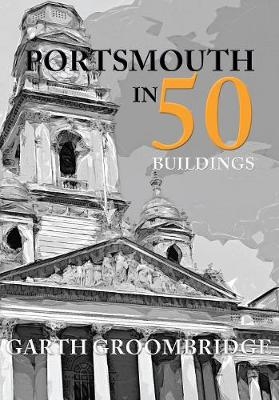
Portsmouth in 50 Buildings
Seiten
2017
Amberley Publishing (Verlag)
978-1-4456-6406-4 (ISBN)
Amberley Publishing (Verlag)
978-1-4456-6406-4 (ISBN)
Explores the rich and fascinating history of Portsmouth through an examination of some of its greatest architectural treasures.
The origins of Chichester, Winchester and nearby Portchester are from the Roman era, while Southampton (Hamwic) and Fareham date back to the Anglo-Saxon period, but it was not until the twelfth century that Portsmouth was founded, and, even then, it was not until the time of the Tudor monarchs — notably Henry VIII and Elizabeth I — that it acquired its true role as the home of the Royal Navy. The history of Portsmouth has been essentially military, and inevitably many of the buildings featured here reflect this — directly, as fortifications or former barracks, or indirectly, like Buckingham House or even the Charles Dickens Birthplace Museum. This primary emphasis on defence shaped the town’s early history and civic geography.
Only with the demise and demolition of the land walls and the loosening of military governance did Portsmouth start to expand, first with the development of Southsea, eventually right across the entirety of Portsea Island and onto the mainland itself. The consequence is a rich and varied architectural and civic history, and a dramatis personae of heroes and villains, cutting-edge military and civic engineers, ambitious property developers and entrepreneurs, a succession of far-sighted local educationists, motivated Catholic and Anglican clergy, at least two of the five world-famous writers, a great maritime artist, innovative architects and town planners, and a twenty-first-century Olympic sportsman. With Portsmouth being at the very heart of the nation’s history for over half a millennia, this book has the difficult task of selecting just fifty buildings from so many, to try and chronicle the astonishing diversity and energy of this great enduring city.
The origins of Chichester, Winchester and nearby Portchester are from the Roman era, while Southampton (Hamwic) and Fareham date back to the Anglo-Saxon period, but it was not until the twelfth century that Portsmouth was founded, and, even then, it was not until the time of the Tudor monarchs — notably Henry VIII and Elizabeth I — that it acquired its true role as the home of the Royal Navy. The history of Portsmouth has been essentially military, and inevitably many of the buildings featured here reflect this — directly, as fortifications or former barracks, or indirectly, like Buckingham House or even the Charles Dickens Birthplace Museum. This primary emphasis on defence shaped the town’s early history and civic geography.
Only with the demise and demolition of the land walls and the loosening of military governance did Portsmouth start to expand, first with the development of Southsea, eventually right across the entirety of Portsea Island and onto the mainland itself. The consequence is a rich and varied architectural and civic history, and a dramatis personae of heroes and villains, cutting-edge military and civic engineers, ambitious property developers and entrepreneurs, a succession of far-sighted local educationists, motivated Catholic and Anglican clergy, at least two of the five world-famous writers, a great maritime artist, innovative architects and town planners, and a twenty-first-century Olympic sportsman. With Portsmouth being at the very heart of the nation’s history for over half a millennia, this book has the difficult task of selecting just fifty buildings from so many, to try and chronicle the astonishing diversity and energy of this great enduring city.
Garth Groombridge was born to a long-established Teddington family. Over the years his interest in architecture and history has resulted in an extensive number of photographs of streets and buildings in many towns and cities across England and Scotland, and in mainland Europe and parts of the former Soviet Union. Since moving to Southampton, and especially with the advent of digital photography, he has undertaken extensive photographic ‘expeditions’ of Portsmouth, Gosport and Southampton.
| Erscheinungsdatum | 28.09.2017 |
|---|---|
| Reihe/Serie | In 50 Buildings |
| Zusatzinfo | 100 Illustrations |
| Verlagsort | Chalford |
| Sprache | englisch |
| Maße | 165 x 234 mm |
| Gewicht | 286 g |
| Themenwelt | Sachbuch/Ratgeber |
| Technik ► Architektur | |
| ISBN-10 | 1-4456-6406-2 / 1445664062 |
| ISBN-13 | 978-1-4456-6406-4 / 9781445664064 |
| Zustand | Neuware |
| Haben Sie eine Frage zum Produkt? |
Mehr entdecken
aus dem Bereich
aus dem Bereich
Wärme – Feuchte – Klima – Schall – Licht – Brand
Buch | Hardcover (2022)
Springer Vieweg (Verlag)
54,99 €
Grundlagen, Normen, Vorschriften
Buch | Hardcover (2024)
Springer Vieweg (Verlag)
134,99 €


